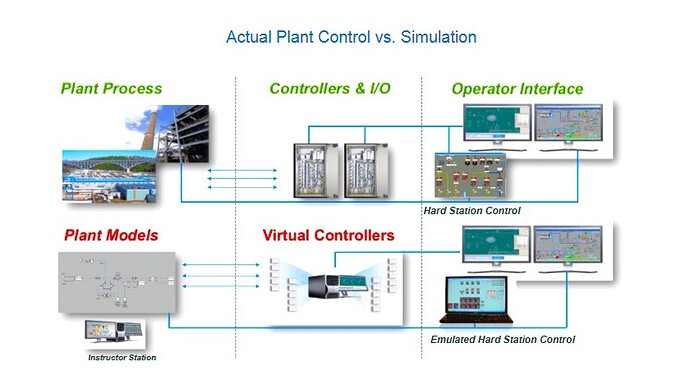Learn the difference between Hardwired Interlock and DCS Interlock in control system automation.
1. Hardwired Interlock:
- Definition: A hardwired interlock is a physical wiring setup using relays, switches, and sensors to create a direct electrical link between safety components and control devices.
- Operation: The interlock logic is implemented using hardwired circuits, ensuring specific conditions must be met for an action to occur (e.g., motor starting or stopping).
- Response Time: Very fast response time due to direct electrical connections without delays from software processing.
- Reliability: High reliability due to reduced complexity and less dependence on software or networks. They are generally less susceptible to software bugs or network failures.
- Flexibility: Low flexibility. Modifying logic requires rewiring, adding new components, or redesigning the circuit, which can be time-consuming.
- Use Cases: Ideal for critical safety functions where the fastest response time is essential, such as emergency shutdowns (ESD), motor protections, and high-pressure interlocks.
- Maintenance: Requires physical inspection and testing, as diagnosing issues involves checking the wiring, relays, and components.
2. DCS (Distributed Control System) Interlock:
- Definition: A DCS interlock is implemented through a control system’s software logic using the DCS programming environment. It uses inputs from field instruments and applies logic in the control system to initiate interlocking actions.
- Operation: Logic is programmed within the DCS, which communicates with field instruments via communication protocols, and executes interlocking conditions based on digital inputs, analog signals, or software-based conditions.
- Response Time: Typically slower than hardwired interlocks due to processing time within the DCS and potential network communication delays.
- Reliability: Dependence on software, programming, and communication networks means it may be more susceptible to software bugs, network failures, or system malfunctions. However, modern DCS systems are built with redundancy to enhance reliability.
- Flexibility: Highly flexible. Modifications can be made through software changes without the need for physical wiring changes, making it easier to adapt to new interlocking requirements.
- Use Cases: Suitable for non-critical interlocking functions that require more flexibility, complex logic conditions, or where frequent changes to interlock logic are expected, such as process sequences or batch controls.
- Maintenance: Easier to diagnose and maintain, as faults can be identified using diagnostic tools in the DCS, and changes can be made quickly via the software interface.
Cost Comparison Between Hardwired Interlock and DCS Interlock
- Installation Costs:
- Hardwired Interlock: Higher installation costs due to the need for extensive cabling, physical components (relays, contactors), and labor for wiring.
- DCS Interlock: Lower installation costs if a DCS is already in place. Minimal wiring is needed, as the logic is software-based. However, the initial cost of setting up a DCS can be high.
- Modification Costs:
- Hardwired Interlock: Modifying the system requires physical changes to the wiring and components, which can be expensive and time-consuming.
- DCS Interlock: Modifications can be made quickly through software updates, which reduces the cost and time involved in making changes.
- Maintenance Costs:
- Hardwired Interlock: Maintenance can be costly, as it requires manual inspection and troubleshooting of the wiring and hardware components.
- DCS Interlock: Generally lower maintenance costs, as diagnostics are software-driven, and issues can be identified and resolved without significant hardware changes.
- Overall Cost Consideration:
- Hardwired Interlock: Typically more expensive for complex systems due to higher material, labor, and maintenance costs. However, for simple, critical interlocks, it may be more cost-effective due to its reliability.
- DCS Interlock: More cost-effective for complex systems with multiple interlocks that require flexibility and frequent changes. The initial cost can be high, but operational and maintenance costs tend to be lower over the long term.
Summary
- Hardwired Interlock: Offers fast response and high reliability but lacks flexibility and is more expensive to modify and maintain.
- DCS Interlock: Provides flexibility and ease of modification but may have a slower response time and potential software-related vulnerabilities.
- Cost Comparison: Hardwired interlocks have higher installation and modification costs, while DCS interlocks are more cost-effective for dynamic processes with changing interlock needs.
The choice between hardwired and DCS interlocks depends on the specific application, safety requirements, and budget. For critical, simple safety functions, hardwired interlocks are preferable, while DCS interlocks are suitable for complex, flexible processes with evolving control requirements.
